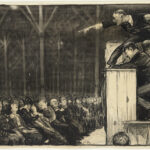“The Bookstore Time Forgot.” Chase Steely visits Elder’s Bookstore in Nashville and muses on the literary and cultural traditions born in that city: “Every city needs an Elder. A keeper who stocks Old Hickory biographies alongside hot chicken histories, who knows that the Fugitives weren’t outlaws and which singers were. State Route 155 carries me back into the stream. Behind me, the books, Randy at his desk, hands moving. Drive out there. Tell Mr. Elder you’re looking for Nashville. He’ll know which one you mean.”
“Here’s How the AI Crash Happens.” Matteo Wong and Charlie Warzel parse the depressing numbers that tell the story of a meteoric rise in AI spending: “The biggest lesson of the past two decades of Silicon Valley is that Meta, Amazon, and Google—and even the newer AI labs such as OpenAI—have remade our world and have become unfathomably rich for it, all while being mostly oblivious or uninterested in the fallout. They have chased growth and scale at all costs, and largely, they’ve won. The data-center build-out is the ultimate culmination of that chase: the pursuit of scale for scale itself. In all scenarios, the outcome seems only to be real, painful disruption for the rest of us.”
“Move Over, Gender Studies: The Conservative Tide Coming for US Universities.” J. Oliver Conroy surveys the various civic institutes that have been formed at several major universities and weighs their prospects for fostering real education: “Their rise has created a peculiar irony: just as the economic utility of the humanities is being questioned, and academic departments are gutted on budgetary or ideological grounds, some schools have found money for heady, old-fashioned curricula emphasizing the ‘great books’ of western civilization and the literature of what used to be called the western canon.”
“Does AI Have a Place in the Pulpit?” Jonathan Gibson talks with religious leaders who have a rather broad range of perspectives on the wisdom of using AI to write sermons: “It’s hard to think of a faith leader more bullish on artificial intelligence than the Rev. Christopher Benek. ‘I look at it as a partner in ministry,’ he recently told The Dispatch. ‘The internet, I think, is going to feel like a very little subject compared to what AI is and the influence it has.’ He’s writing a book called The Church Leader’s Guide to Artificial Intelligence in which he outlines his beliefs about an AI-filled future. There is no question that AI is already speeding up his productivity when it comes to sermon writing. ‘I have been able to write all my sermons for the next year in one week,” he said.”
“The Technocratic Desert.” Mark Clavier points to the underlying cause for our polarized and despairing politics and calls for moral rhetoric to water desiccated hearts: “The usual explanations are familiar: social media, grievance, and economic anxiety. These certainly play their part. Social media amplifies anger while its algorithms radicalise opinion. Globalisation and automation have hollowed out the local economies that once gave people security and purpose. Many citizens feel unseen and unheard as their anxieties deepen. Yet grievance and insecurity aren’t new. What’s changed is the moral ecology in which discontent takes shape.”
“Introducing The Third Oikos: Homemaking Reimagined.” Michael Toscano introduces a new series from the Institute for Family Studies that looks at ways in which new technologies may make possible more family-friendly economies: “Remote work, however, is only one pro-family possibility. Family-owned organic farms are relying on Facebook groups to access markets that they would otherwise be unable to serve, and Starlink makes it feasible for domestic businesses to operate far beyond the boundaries of established internet networks. Chest freezers, likewise, have become an essential means of storage for these businesses; and 3D printing and other new small-scale design and manufacturing platforms offer the potential for a whole new form of the domestic economy. These technologies could provide the foundations of a new homestead for the 21st Century.” In some ways, the debates about these technologies echo earlier debates in the 1930s about whether cheap, reliable electricity and the small motors it runs would decentralize industry. The possibilities are tantalizing. The track record is not good.
“Nick Offerman Told Me That Swinging a Hammer Might Change My Life.” Rose Maura Lorre talks with Nick Offerman and starts hammering things: “We spend hours doing only this, just hammering nails into wood. Offerman told me that it would be ‘a blast,’ and it is. I try both the 12-ounce and the 16-ounce Estwing hammers. It’s a slight difference, but I prefer the latter; the bit of extra weight seems to help me drive the hammer more assuredly, with less wobbling on its path toward the nail head. I feel so energized. I want to call a friend and ask them to come over and have a beer and hammer some nails with me. I truly want to hammer nails all day long. In the morning, in the evening, all over this land.”
“Farmers Struggle With Tariffs, Despite China Deal to Buy US Soybeans.” Lisa Held talks with farmers and others about how the food economy is doing: “Trade missions and cash payments will help farmers immediately, said Karen Hansen-Kuhn, the director of trade and international strategies at the Institute for Agriculture and Trade Policy, but she believes the situation illustrates the precarity of a U.S. food system that supports a handful of commodity crops, primarily for export, for animal feed and biofuels. ‘We have this whole farm policy system that is built on overproduction of just a few crops. That system that depends so much on exports is really fragile,’ she said. ‘I think we can predict, with or without Trump, if we continue with the same policies that a few years from now there will be something else that will throw the system off. It has very little resilience built in.’”
“So You’ve Decided to Save Your Kids from Tech.” Meg Leta Jones reviews two new books on tech and families and considers how we might make family life more humane: “Together, the two authors provide the motivation to make significant social and political investments in changing technical infrastructure in ways that support the future of the American family. If we are to resist the platformization of the family, we must ask what new and old functions serve the family and how technical infrastructures may provide those functions. What tools and arrangements serve intimacy, incremental independence, tactile exploration, and intergenerational understanding? And which lead to distraction, addiction, and isolation?”







